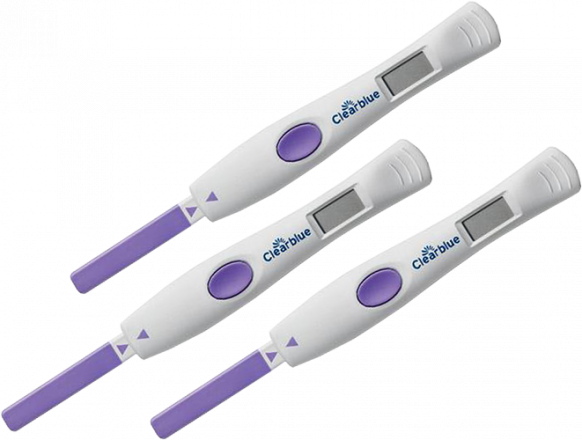Clearblue
Pregnancy and Ovulation Tests
Clearblue tests can help you find the answers you are looking for by providing clear results with accuracy and convenience. Our current range of products includes pregnancy tests, ovulation tests.
Over the past 33 years over 23,000 volunteers have been involved in Clearblue clinical research in more than 140 trials. We are committed to helping you manage your reproductive health.
How to get pregnant ?
You can only get pregnant if you have unprotected sex during the few days each menstrual cycle leading up to and including the day of ovulation. So, if you are trying to conceive Clearblue Ovulation Tests enable you to identify these fertile days helping you to get pregnant faster
Am I pregnant ?
Various early pregnancy symptoms can indicate you might be pregnant. They differ from woman to woman and from pregnancy to pregnancy. If you are pregnant, you may notice one or more of these symptoms or none at all. That’s why Clearblue® Digital Ultra Early Pregnancy Test can be used up to 6 days before your missed period, which is 5 days before the day you would expect your period to start (your ‘expected period’ day).4
Over 30 years of World firsts from the pregnancy and fertility category experts. The Clearblue brand has a history of more than 30 years of innovation, giving women confidence and reassurance. That’s why over 20 million women choose our products every year and over 30 million women visit our website to find the answers they need.
Our mission
We put women right at the heart of everything we do – from education and technological development through to design, research, clinical studies, field trials and testing. Our mission is to transform the way women manage their reproductive health.
Our history
For over 30 years we have helped millions of women across the globe by delivering accurate & clear answers at life-changing moments. Whether trying to conceive or thinking they may be pregnant, we have been supporting women with innovative Clearblue products to manage their reproductive life.
- 1988
First one-step pregnancy test
- 1989
Launch of first one-step ovulation test
- 2003
World’s first digital pregnancy test by Clearblue
- 2008
World’s first pregnancy test that indicates when a woman conceived
- … all from Clearblue
Clearblue careline
Our team of trained Clearblue careline advisors are here to help. Whether you have a simple technical question about one of our products or want friendly advice to help you on your journey to parenthood, our dedicated team of professionals is here for you.
Clearblue® Experts
We engage with a range of independent Healthcare Professionals to continue to ensure our scientific and educational understanding is up-to-date with the latest scientific and clinical trends. Our independent experts also critique our Clearblue® product-related activities. Our Advisory Board is made up of a range of fertility, pregnancy, contraception and sexual health experts with a broad range of experience.

Dr Kurt Barnhart is Vice Chair for Clinical Research and the Director of the Women’s Health Clinical Research Center for the Department of Obstetrics and Gynecology in the Perelman School of Medicine at the University of Pennsylvania. He is the William Shippen, Jr. Professor Obstetrics and Gynecology and Epidemiology. He received his medical degree at Mount Sinai School of Medicine, and his M.S.C.E. degree (Clinical Epidemiology and Biostatistics) at the University of Pennsylvania. He is a board certified in obstetrics and gynecology as well as reproductive endocrinology and infertility.
Dr. Barnhart’s current research interests are focused on clinical and epidemiologic aspects of reproduction including ectopic pregnancy, miscarriage, infertility, family planning, and prevention of HIV. His research papers have appeared in journals such as Fertility and Sterility, Human Reproduction, Contraception, Obstetrics and Gynecology, The Journal of the American Medical Association, and The New England Journal of Medicine. He also has served on numerous NIH Study Sections and scientific committees of the American Society of Reproductive Medicine and American College of Obstetricians and Gynecologists. Dr Barnhart is also currently the Editor in Chief for Fertility and Sterility.

Dr. Suruchi Thakore is a physician specializing in Reproductive Endocrinology and Infertility. She is the Medical Director for the West Michigan offices of IVF Michigan and Ohio Fertility Centers. Prior to moving to Michigan, Dr. Thakore was the Division Director of the University of Cincinnati Division of Reproductive Endocrinology and Infertility. Her clinical interests include third party reproduction, fertility preservation for single women and oncology patients, polycystic ovarian syndrome, and reproductive endocrine disorders. Her current research is focused on quality and performance improvement in the clinical setting, optimization of fertility procedures, social egg freezing, and fertility preservation. Dr. Thakore is a member of AMA, ACOG, SREI and ASR.
Dr. Thakore received her medical degree from the State University of New York (SUNY) at Buffalo School of Medicine in 2009. In 2013, she completed her OB/GYN residency at the Women and Children’s Hospital in Buffalo, NY. In June 2016, she completed her Reproductive Endocrinology and Infertility Fellowship at University Hospitals at Case Western Reserve University and moved to UC Health Center for Reproductive Health at the University of Cincinnati. She is board certified in Obstetrics and Gynecology and Reproductive Endocrinologist and Infertility.

Michael A. Thomas, MD is Chief of the Division of Reproductive Endocrinology and Infertility at the University Of Cincinnati College Of Medicine, Cincinnati, Ohio. His previous roles include Director of the Center for Reproductive Health at the University of Cincinnati and Executive Vice Chairman of the Department of Obstetrics and Gynecology.
Dr Thomas gained his MD from the University of Illinois College of Medicine in 1984, and was a resident at Wayne State University in Detroit. Dr Thomas completed his fellowship in reproductive Endocrinology and Infertility at the University of Cincinnati, and is board certified in Obstetrics and Gynecology and Reproductive Endocrinology and Infertility. His research interests include Infertility, Endometriosis, PCOS, Stress and Reproductive Function, Reproductive Endocrinology, and Menopause. He is also a member of the Society of Reproductive Endocrinologists, Association for Reproductive Health Professionals, ASRM Patient Education Committee, and ASRM Contraception Special Interest Group.
Professor Thomas is nationally recognized as a leader in the field of assisted reproduction and has published extensively in this area including articles in Fertility and Sterility, the Journal of Assisted Reproduction and Genetics, the Journal of Clinical Endocrinology and Metabolism, and Menopause.

Monica Moore is the founder of “Fertile Health, LLC”, a consulting company created to train new nurses in reproductive endocrinology and to encourage nutritional practices into fertility centers. She is a Women's Health Nurse Practitioner, and was one of the nurse managers at Reproductive Medicine Associates of Connecticut (RMA of CT) and continues to work as a consultant for them. Prior to joining RMA, Monica was the donor nurse coordinator at the Atlanta Center for Reproductive Medicine. Monica's first job in reproductive endocrinology was at Cornell Center for Reproductive Medicine and Infertility 20 years ago.
Monica's passion lies in nutritional interventions for couples attempting pregnancy and for women diagnosed with PCOS. Other research interests include: improving the efficiency of donor oocyte programs, advancing education for nurse managers, and developing online reproductive nursing teaching courses. Monica has published print and online journal articles, the latest of which was published in JOGGN. She has chaired and spoken at nursing courses at national conferences and was a recipient of the IVP Care's Professional Patient Education Grant.
Monica received her undergraduate and graduate degrees from the University of Pennsylvania, where she was a member of Sigma Theta Tau, the nursing honor society.

Michael Zinaman is board certified in both Obstetrics and Gynecology and Reproductive Endocrinology and Infertility and is the Chairman of Obstetrics and Gynecology at the North Bronx Health Network and a Professor at the Albert Einstein College of Medicine. He also is currently serving as Interim Chief Medical Officer of Jacobi Medical Center.
Professor Zinaman gained his M.D. from the State University of New York. He did his Residency at the University of Chicago and Fellowship at Georgetown University. His research interests include reproductive health, uterine anomalies, fibroids, endometriosis, polycystic ovarian syndrome, pediatric endocrinology, menopause and infertility. His current NIH funding involves advanced imaging of the human cervix. He is a member of, among others, the Society for Reproductive Endocrinologists, the Association of Professors of Gynecology and Obstetrics, and the Accreditation Council for Gynecologic Laparoscopy.
Professor Zinaman has published articles in the Journal of Endocrinology and Metabolism, The Lancet, Pediatric and Perinatal Epidemiology and The Journal of the American Association of Gynecologic Laparoscopists. He has recently moved back home to New York City.

Sarah L. Berga, MD is Professor and Chair, Department of Obstetrics and Gynecology, Jacobs School of Medicine and Biomedical Sciences, University at Buffalo SUNY. Dr. Berga received her BAS from the University of Virginia and her MD from the University of Virginia School of Medicine. She completed her residency in Obstetrics and Gynecology at Harvard University followed by a fellowship in Reproductive Endocrinology at the University of California San Diego School of Medicine.
Dr. Berga served as Director, Division of reproductive endocrinology and infertility, University of Utah, 2018-2020; Chair of Obstetrics and Gynecology and Executive Director of Women’s Health at Wake Forest University School of Medicine in Winston-Salem, North Carolina from 2011 to 2018; Professor of Gynecology and Obstetrics and Psychiatry, and Chair of Gynecology and Obstetrics at Emory University in Atlanta, Georgia from 2003 to 2011; and was a faculty member in Obstetrics, Gynecology, and Reproductive Sciences and Psychiatry at the University of Pittsburgh from 1988 to 2003.
Her research interests include neuroendocrine mechanisms mediating stress-induced reproductive compromise and understanding the impact of sex hormones on brain health using state-of-the-art neuroimaging in human and monkey models. Her team pioneered the use of cognitive behavior therapy for stress-induced anovulation. Her clinical interests include IVF, infertility, reproductive aging, hypothalamic amenorrhea, polycystic ovary syndrome, and hormonal management of perimenopause and menopause.

Dr Julie Oliver completed her medical degree at the University of Leeds and after training in obstetrics and gynecology she made the shift to general practice.
Dr Oliver is now an accredited GP with Special Interest (GPwSI) in Gynaecology working within North Durham CCG and has set up a business called Durham Gynae which is commissioned to provide GPwSI services. She is also an accredited trainer for the Faculty of Sexual and Reproductive Healthcare.
Dr Oliver has interests in women’s health, sexual health and teaching, and was part of a team which set up the Primary Care Women’s Health Forum, helping to spread the word across the primary care community of changes and developments.

Professor William Ledger is Head of Discipline of Obstetrics and Gynaecology of the Faculty of Medicine at the University of New South Wales, Director of Reproductive Medicine and Senior Staff Specialist at the Royal Hospital for Women and a fertility specialist at City Fertility in Sydney. He founded the Fertility and Research Centre (FRC), a joint venture between University of New South Wales and South East Sydney Local Health District as a centre for translational research in reproductive biology and reproductive medicine. The FRC has Government funding to provide a Statewide service in oncofertility: preservation of sperm, oocytes and embryos for young people prior to gonadotoxic chemotherapy or radiotherapy. The centre is unique in Australia and is currently running three randomised trials, two observational studies and an early stage translational project to improve techniques for in vitro maturation of human oocytes. The work of the centre has generated two patents.
He is Chair of the RANZCOG Research Committee and a member of the Scientific Advisory Committee of the Fertility Society of Australia. Recently, he was a member of an NHMRC Working Party to review national guidelines on ethics and ART and Chair of the MBS Working Party on costs of ART.
- Weeks since conception shown as 1-2, 2-3 or 3+ on screen
- In a study of 87 women, 4 or more fertile days were identified in 80% of cycles using actual cycle length (2012.
- The World's No: 1 selling brand in home pregnancy & fertility tests. Based on international sales compiled using independent market research data (data on file).
- Clearblue Ultra Early. ’Missed Period’ refers to the day after the day you expect your period. In lab testing 79% of pregnant results were detected 5 days before the expected period, 96% were detected 4 days before and >99% were detected from 3 days before the expected period.




